Inside the 2021 Longlist | Current Events & Public Affairs
December 09, 2021
Getting up his courage to dive into their anxiety-inducing subjects, Dylan Schleicher examines the best books 2021 had to offer in the Current Events & Public Affairs category.
It is usually one of my favorite categories, but the idea of poring over books about current events and public affairs seemed like a chore this year. I don’t turn to books for escapism or comfort (well, I guess sometimes I do), but things have been so bleak in current events and public affairs recently that I was not super keen to immerse myself for weeks reading about them. These past two years have reminded me of Conor Oberst’s song “Milk Thistle,” particularly this verse:
Newspaper, newspaper, can't take no more
You're here every morning waiting at my door
And I'm just tryin' to kiss you and you stab my eyes
Make me blue forever like an island sky
And I'm not pretending that it's all okay
Just let me have my coffee before you take away the day
Once I began engaging with the books submitted in the category, though? Well… it was still more than a little distressing and depressing at times, but it was also illuminating. Experts are coming under a seemingly never-ending barrage of suspicion and attack, but if we want to overcome the challenges and crises we face, we need the understanding that comes with prolonged and in-depth study and expertise in many different fields, and I once again found a deep appreciation for the power and soul of books and authors brave enough to take on such weighty and complex topics. The five books in this year’s collection are troubling enough at times to take one's breath away, but they all add breath to important conversations we need to have at the highest levels and in each of our homes, and they offer some hope in doing so.
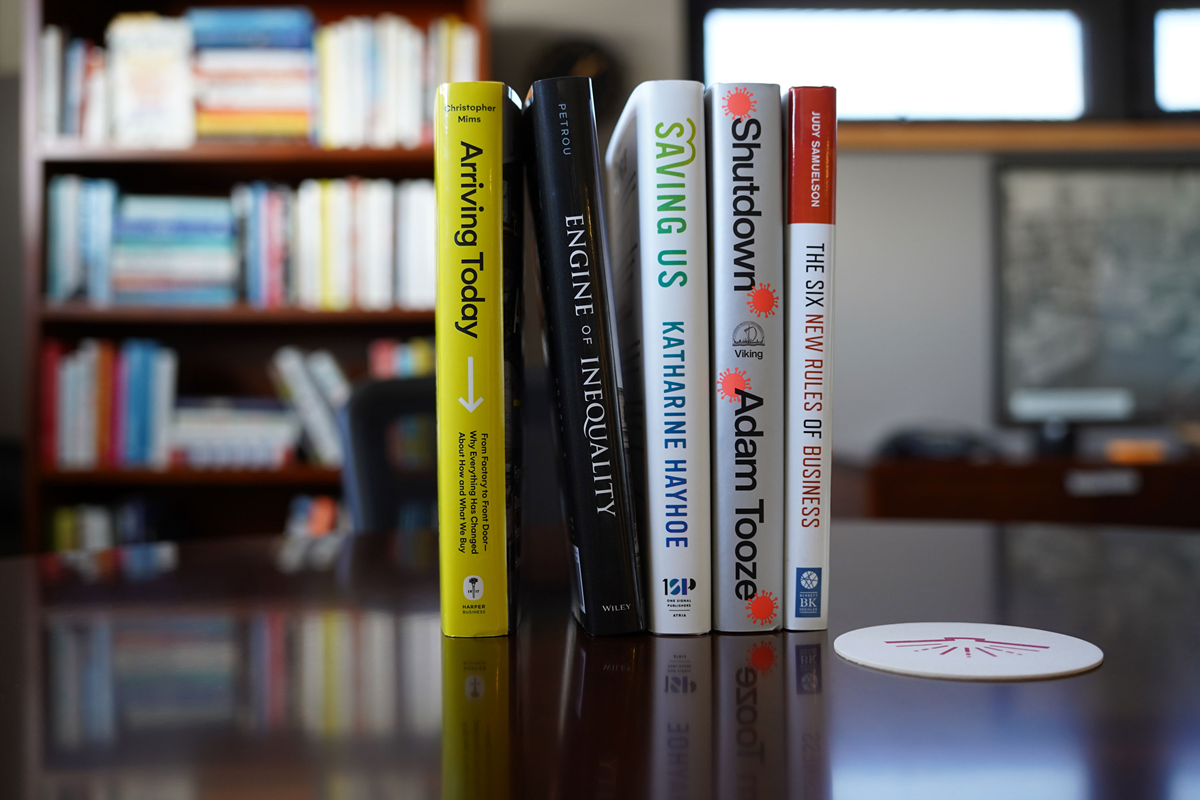
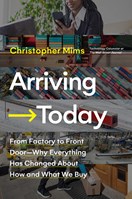 Arriving Today: From Factory to Front Door—Why Everything Has Changed About How and What We Buy by Christopher Mims, Harper Business
Arriving Today: From Factory to Front Door—Why Everything Has Changed About How and What We Buy by Christopher Mims, Harper Business
I found myself thinking a lot about Jack Covert, who passed away this year, while reading Christopher Mims’s Arriving Today. It is exactly the kind of book that I know Jack would have loved and raved about: wide-ranging and globe-trotting, focused in on the journey of a single object as a proxy for explaining how the world works, and impeccably and artfully written. Consider this line from the book’s opening:
The Leviathan that is the global economy has many hearts, each one a complex of ports, rail hubs, and highways pushing almost everything we consume across oceans and continents. We are in the antechamber of one of them. I am here for an audience with giants—cranes as big as buildings, ships as big as skyscrapers, conurbations of stacked shipping containers like cities unto themselves.
Arriving Today was submitted in the Narrative & Biography category, but by the time we began our reading and deliberations on the over 7600 submissions, the supply chain was a topic of constant conversation in the daily paper and on nightly news. Mims began his journey following the supply chain of a USB charger just as the pandemic hit, when the “gobsmacking effort and complexity behind its delivery to your home” began to break up, and supply chains became tangled, disrupted, and delayed. This timing makes his deep dive into this important but mostly hidden-from-view aspect of our everyday economic lives an even more poignant chronicle of our times, one that—with all its technological and managerial complexity—keeps the many humans who touch every object that arrives at our homes, and the human cost of the process, in clear view.
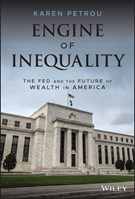 Engine of Inequality: The Fed and the Future of Wealth in America by Karen Petrou, Wiley
Engine of Inequality: The Fed and the Future of Wealth in America by Karen Petrou, Wiley
I am no hater of the Federal Reserve. I found Roger Lowenstein’s book about its creation, America’s Bank, downright inspirational, even a model for what we need more of in our own times. But as Karen Petrou makes apparent in her brilliant book, Engine of Inequality, Fed policies in the aftermath of the Great Recession unintentionally exacerbated inequality and are likely to continue doing so if we don’t change course. Petrou is a financial policy analyst, but she is not just any policy analyst; she is the co-founder and Managing Partner of Federal Financial Analytics, a perch from which she advises some of the world’s largest corporations, major financial institutions, and central banks. American Banker has called her “the sharpest mind analyzing banking policy today—maybe ever.” So when she speaks, people usually listen. Unfortunately, they don’t always act. When the financial crisis hit, most Americans were hit hard. And, unlike the stock market, most were unable to quickly recover—let alone reach new heights. Unlike the banking system, which had been buttressed by trillions of dollars in investment from the Federal Reserve, the policies enacted did not act as a backstop for most American workers and small businesses as the Fed intended. The pandemic exposed and intensified the severities of those inequalities even more. Petrou explains how the immoral and unsustainable levels of inequality that exist today are not only bad for people, but bad for business. In turning from analysis to advocacy, she shows us how the fight against it can be won much more quickly—on terms we should all be able to agree on—than we might imagine.
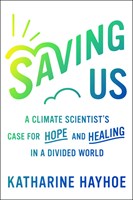 Saving Us: A Climate Scientist's case for Hope and Healing in a Divided World by Katharine Hayhoe, Atria/One Signal Publishers
Saving Us: A Climate Scientist's case for Hope and Healing in a Divided World by Katharine Hayhoe, Atria/One Signal Publishers
From saving us from inequality and its economic calamity to saving us, full stop, we turn to the topic of climate change. It could be argued that talking about it isn’t enough, but there is a reason we must talk about it. There are many ways the pandemic has been analogous to climate change, and one of the more unfortunate ones is the way both have been so politicized. Katharine Hayhoe was not surprised when disinformation began to spread amid the politicization of the coronavirus, because she has witnessed the same thing happen in her field of study and expertise, climate change, which she believes has become “the most politicized and divisive issue in the U.S.” It is for that reason Hayhoe believes talking about it is the most important thing we can do. In Saving Us, she gives us all a better and more fruitful way to have those conversations, rooted in the common ground of things we all care deeply about: “the health of our families, the economic strength of our communities, and the stability of our world.” If we were faced with losing our house, we would stay up talking about it through the night, figuring out what we could possibly do to keep it. Protecting the only home we all share, the planet Earth, is good for everybody, and it should be a kitchen-table conversation, too. The science tells us there is still time to take action that can avert the worst-case scenarios associated with climate change. And we certainly have to do much more than just talk about it, but it is unlikely we’ll be able to do much of anything without talking about it. Katharine Hayhoe helps us get the conversations going.
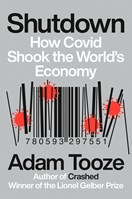 Shutdown: How Covid Shook the World's Economy by Adam Tooze, Viking
Shutdown: How Covid Shook the World's Economy by Adam Tooze, Viking
Adam Tooze’s Shutdown is, as the subtitle suggests, about How Covid Shook the World’s Economy, but it also unearths the shaky ground that the world’s economy was already on before anyone had ever heard of SARS-CoV-2, and the attached social and political fault lines that laid beneath the surface and turned into earthquakes amidst the pandemic.
Most of us felt a sense of disbelief and powerlessness when the pandemic hit, but the economic impacts and implications of the disease on our lives were the results of choices made by those in positions of power to manage the crisis—largely technocratic events and decisions that are meticulously recounted in the book. The results were decidedly mixed and unequally applied across the world. With every indication pointing to continued and accelerating crises on the horizon, the question becomes what have we learned? In Tooze’s view, “either we take seriously the need to build more sustainable and resilient economies and societies and equip ourselves with the standing capacities necessary to meet fast-moving and unpredictable crises, or we will be overwhelmed by the blowback from our natural environment.” A lot has transpired and been transformed, but fundamental, underlying instability remains. “What needs adjusting,” Tooze believes, “is our common understanding of the reality we are actually in.” From the role of political parties in different countries to the role of interest rates and qualitative easing on the economic lives of the entire economic system, there is a lot to take in, all pointing to why the “continuation of the status quo is the one option we do not have.”
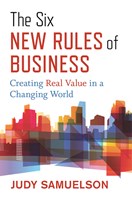 The Six New Rules of Business: Creating Real Value in a Changing World by Judy Samuelson, Berrett-Koehler
The Six New Rules of Business: Creating Real Value in a Changing World by Judy Samuelson, Berrett-Koehler
For too long, the idea of “what’s good for business” has been reduced to profit maximization. Shoring up a business has come to mean shoring up its short-term financial position, whatever it might cost in other terms to do so. But “what’s good for business”—if it means short-term profit maximization—is an unsustainable economic model and becoming an untenable position to take, and there is a reformation under way. The idea of “what’s good for business” is changing. As Judy Samuelson sees it from her perch as the founder and executive director of the Aspen Institute Business and Society program, the “walls between business and society” that kept companies shielded from a full accounting of their effect on society while maintaining an outsized influence over it, are crumbling. The “core assumptions and dominant beliefs” of business are slowly evolving, being pushed by both outside activists and those within. Samuelson is one of those champions. She helps us understand why we can no longer separate market value from our values. If we do, markets lose their legitimacy and use to society. The old rules of value extraction are sapping the value of markets, undermining the businesses that must play by those rules and the democratic values of the society they are supposed to serve. The Six New Rules of Business charts a new and more sustainable path.







